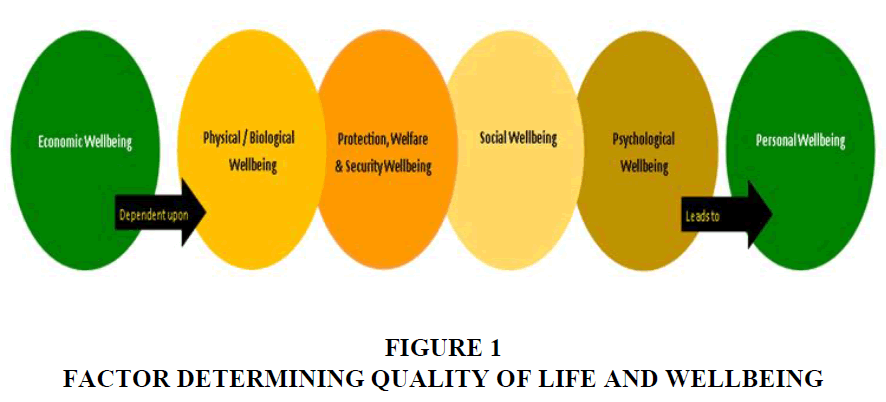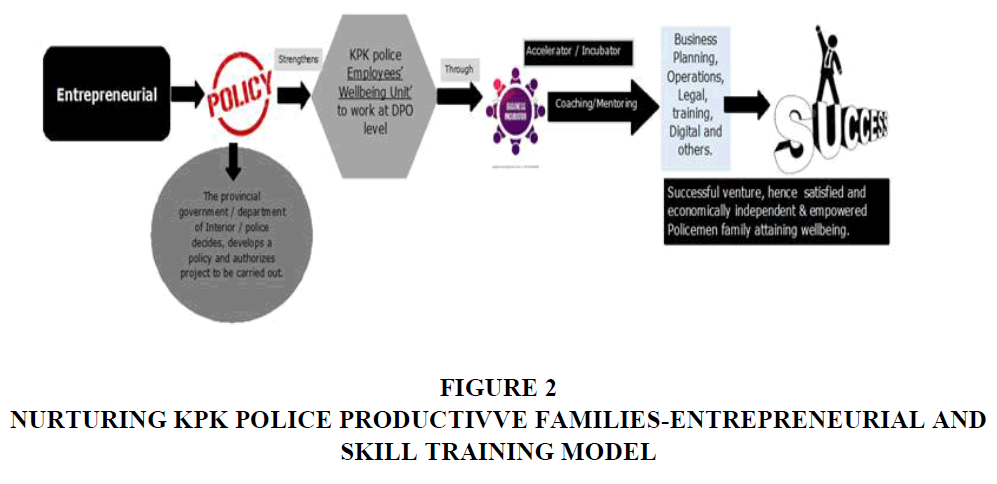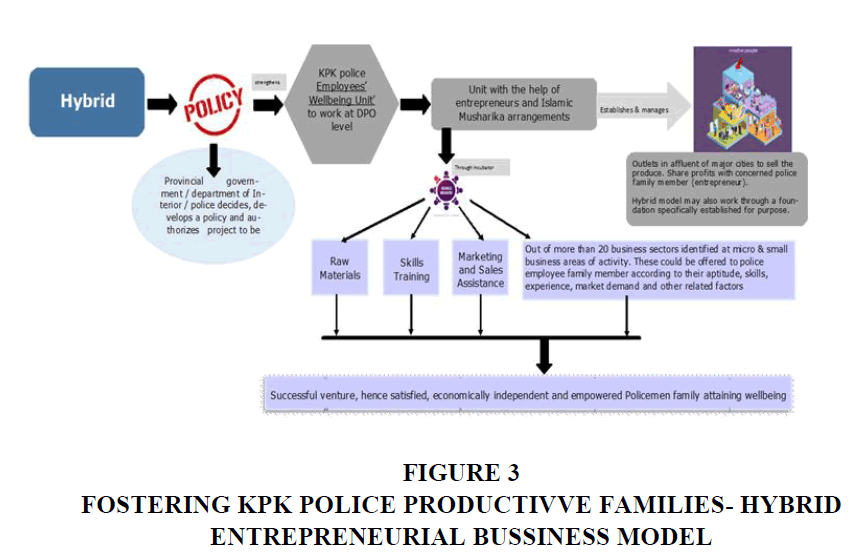Research Article: 2022 Vol: 28 Issue: 5S
An Entrepreneurial Approach for Government Employee Family Welfare in Developing Countries
Muhammad Khan, EFFAT University
Citation Information: Khan, M. (2022). An entrepreneurial approach for government employee Family welfare in developing countries. Academy of Entrepreneurship Journal, 28(S5), 1-7.
Abstract
Developing countries like Pakistan face challenges of payment of sufficient benefits at the superannuation to their government employees. Anticipating this the employees resort to unfair practices in an endeavour to safeguard own and family’s future post retirement. This paper identifies the problem and proposes a solution whereby the government has minimal resource investment and yet their employees and families can generate revenues on continual basis through productive family concept. The model is proposed for Khyber Pukhtoon Khwa (KPK) province police department initially and can be replicated for other government departments and countries. The concept can generate a number of jobs and raise the economic conditions at micro levels thus contributing nationally.
Introduction
Homo sapiens are constantly involved in a struggle to achieve personal wellbeing. However, as the times passed the wellbeing landscape evolved as well and realizing the personal wellbeing became dependent on a number of factors as shown in Figure 1. The economic wellbeing cannot be achieved unless the humans are physically and biological strong and able to perform tasks that can produce wealth. Moreover, the protection and security are required in order to achieve the social and psychological comfort and realize the personal comfort and wellbeing.
Every year hundreds of police force personnel die performing their routine daily life to protect, help and shield society from known and unknown dangers. More than 1400 brave police employees have laid their lives in last 10 years in KPK (Geo News, 2018). This requires huge recognition and all steps should be taken to offer gratitude for their efforts and services rendered. Humans can act deviously when their wellbeing is not taken care of and yet it is expected of them to perform in scrupulous and dedicated manner. Mustakim (2017) suggests that developing communities can be achieved through entrepreneurship. Similarly, Santos & Neumeyer (2021) opine that the poverty can be minimized through entrepreneurial interventions (De Silva et al., 2021).
The police forces around the world enjoy economic wellbeing and security during and after superannuation and can be related to people working in other fields and jobs (Sulaiman, 2018). How can they are expected to work longer hours, earn comparatively less money, have huge powers and yet continually ponder on his/her family future during and post retirement. The police image is unjustifiably tarnished, efforts and services ignored and blamed for the debauched corrupt economic practices.
A department and its personnel can be held responsible and accountable Butarbutar, (2017) if the welfare of the employee and his/her family, during service, post retirement and upon demise is ensured and secured. However, if the employee is unsure of their economic future, they will act opportunistically. Therefore, it is the responsibility of the state. (De Silva et al., 2021)Though, Pakistan which ranks 171 among 200 countries in GDP, PPP per person; according to (Ciafactbook, 2020); its government may not be able to provide an answer. Zehra & Usmani (2021) argued that family entrepreneurship can keep the families integrated and move towards prosperity. On the other hand, Zhu et al. (2019) while comparing the women entrepreneurship transitional economies suggested that families when working together in micro and small entrepreneurial ventures can bring self-sustainability to communities (Ingalagi et al., 2021).
A Keeping this in view and examining the economic conditions of the families of the non- officer cadre of the police department in KPK, a strategy is proposed to be implemented at the police department which can bring much needed vitality and autonomy to the families of these employees.
Police Force of KPK and its Employee Welfare
The KPK province employs more than 83,000 people. According to Pakistan Bureau of Statistics (2020) average household size in KPK is 6.31 persons. It will make more than 0.523 million people associated and requiring welfare programs every year. Similarly, if 3% of the employees retire; on same ratio it would mean 2490 retiring personnel *6.31 and that means more than 15,700 people looking for a means of income every year with very little regular income coming to the household. These are daunting numbers for an economically frail country and then even more for a shoddier province. The retirement benefits including the gratuity, provident fund etc. and the pension are also not enough to run a household with current inflation rates. This means a denial to a decent living.
Therefore, it warrants and requires an innovative approach to help the department realize welfare schemes for employees post retirement in particular and during the service in general. This will help release the stress and motivate the employees work more productively, transparently in just and fair manner because economic woes lead the humans to act unethically and compromise fairness.
KPK police Recruitment Strategic & Implementation Plan 2018-2023 reveals core values but does not identify that it values “Employee welfare post retirement”. The SWOT analysis in the plan reveals the threat of losing donors exist. This means the additional restraints and burdens may fall on the department in future. The department also has developed a commendable strategy in recent years for employees who embrace martyrdom. These welfare plans include Shuhada package and priority in recruitment at all ranks on basis of their qualification and age. However, it is evident that the plan falls short of developing and implementing comprehensive employee welfare plan post superannuation.
Proposal, its Aims and Objectives
It seems pertinent to devise and implement a project which can help eradicate the social pressures and economic insecurities from the police department employees. This would help them realize their potential and perform optimally in the best interest of the country, the masses and the province.
In order for the project to catalyse the financial security, develop productive families and release social and economic pressures from its employees two models based on entrepreneurial philosophy and principles is being presented.
The project would:
• Assist the employees achieve financial security for the employees during and after their service.
• Create jobs for family members of the police department employees in particular and others in general.
• Develop new sustainable tiers in the economic fabric and social of the province
• Release social and economic pressures from the employees and their families.
• Bring sustainability to welfare schemes of the police department.
• Help raise the performance bar of the employees through its outcomes and
• Raise the confidence of the general public in the department.
It is the opportune time for this police welfare program grounded in surface realities, requiring little or no governmental funding with least involvement of police personnel yet help the department achieve social and economic wellbeing for its employees, achieve its targets of candid work environment, raise the public confidence and raise performance bar.
The proposed models of KPK Police Employee Welfare
There could be two models built upon entrepreneurship, i.e. Entrepreneurial and Skill Training Model and Hybrid Entrepreneurial Business Model to nurturing KPK police productive families. Both are discussed below. These proposals once implemented would allay the economic woes and fears of the police department employees and they would be able to work and perform better.
For both models the department/provincial government will provide legal and protective umbrella by taking the policy decision to implement the police employee family welfare initiative and ensure all such necessary support.
Both the models recommend development through accelerator / incubator which could be established at each district level or the province districts could be divided in 10-11 zones of 3 or 4 districts depending upon the population size of the police force employees, market size and others.
Entrepreneurial and Skill Development-Productive Families
This model of productive KPK police employees’ welfare hinges upon entrepreneurial and skills development of eligible employee family members. There would be two options available, first will be through the entrepreneurship accelerator and second through standalone registered entrepreneurs (employee family members who already possess necessary skills and experience). This documents identifies two strategies. Either one or both could be implemented concurrently. These plans are based on development of local ecosystems and support infrastructure at little or no cost to police department/provincial government see in Figure 2.
The accelerator/incubator at each district level will provide holistic assistance and would identify the eligible members of the employee family and develop their entrepreneurial, business and other skills. These skills will aim to enhance the potential entrepreneur’s ability to understand the latest concepts in the business, understand the importance of customer satisfaction, and develop skills to maintain the accounting books, advance and implement marketing and promotion strategies at district, provincial and or the national levels. These trained family members with the help of revolving fund, investments or funding, a business plan (based on the individual education, experience, market size for proposed product and or service and aptitude) would be established. Such developed entrepreneur would be assisted in developing business plan, feasibility study, business, operations and marketing training etc. The accelerator/incubator owners will share profits and losses with family member entrepreneurs.
The police department would help secure suitable outlets at provincial headquarters and in major cities to sell the products of productive families. These outlets would be called “Police Employee Family Welfare Shops” The profits would be shared between the entrepreneurs, police welfare unit and the shops owners.
Hybrid Entrepreneurial Business Model - Productive Families
The program will be carried out at district level through identified and purposefully enlisted entrepreneurs and a musharaka company would be established. This will help the groomed/mentored and coached entrepreneurs sell their produce in the market and reap monthly salaries to produce products/services for the musharaka company.
The district based entrepreneurship unit performs the tasks through entrepreneurs and a musharaka company that benefits from the services of an accelerator/incubator. The selection of potential entrepreneur for accelerator or incubator would depend upon the applicant personality characteristics, aptitude and business requirements. In order to make the arrangement economically and financially attractive the unit may seek collaboration with an existing musharaka company or establish a new and bring sustainability and revenue as shown in Figure 3.
In this arrangement the accelerator/incubator would provide skill training to the potential entrepreneur. Upon completion of the training the unit would provide the raw materials to the entrepreneurs to produce the product/service at a predetermined price per unit.
In order to provide increased benefit to the family members/entrepreneurs the accelerator/incubator would provide extra raw materials. For example, if 100 units of a product requires 10 kilograms of raw materials, the entrepreneur would be provided with 13 kilograms of the raw materials. This would give the entrepreneur ability to produce extra and sell that to either the “Police Employee Family Welfare Shops” or in the market or to the musharaka company/welfare unit. The unit would also pay a certain amount to the entrepreneur for producing the number of units they do.
Finding Options
Funding would be required for these start-ups / entrepreneurs start the project with minimal stress. Commonly start-ups are compelled to pay interest, equity / shareholding, be at the mercy of institutions or wealthy investors for financial resources. They also at times face massive difficulties of the bureaucratic and banking restrictions and delays.
Funding requirement could also be served through crowdfunding. A platform for such funding could be established at provincial level.
Second alternative is that depending upon the funding available an endowment fund in the name of “Police Employee Family Welfare Fund” could be established. This fund would be managed at the provincial level and each district unit would be eligible for a certain amount based on the number of potential entrepreneurs from employee families, size of business (investment size) and total number of beneficiaries in the district. Part of the revenues would be distributed to the needy families and remaining inducted back in the fund for future use and sustainability.
Conclusion
The implementation of the plan would provide numerous economic, social and financial benefits as identified below.
• Community – social impact
• Stakeholder impact
• Relief to the employees from economic woes
• A new approach to development and acquiring welfare at no or little cost
• Women empowerment
• Productive families development
• Contribution to overall police employee welfare
• Assistance in long term economic and financial sustainability of the department
• Reduction in overall provincial unemployment rates
• Economic uplift of financially weaker section of society
• Peace of mind for the police department employees
• Security of financial future of the police department employees
With little or no income this project can play a vital role in the police department welfare which can be replicated in other provinces of the country. The plans will require a suitable space provided by the department at the district police facilities and properties.
References
Butarbutar, G.R. (2017). Analisis faktor-faktor yang mempengaruhi pendapatan usaha industri makanan khas di kota tebing tinggi. Jom Fekon, 4(1).
Ciafactbook (2020). The world fact book, Pakistan, Asia. https://www.cia. gov/library/publications/the-world-factbook/geos/pk.html
De Silva, T., Männikkö Barbutiu, S., Wakanuma, K., & Dhameeth, G. (2021). Empowerment Through Women Entrepreneurship : A Case from the Beauty Salon Sector in Sri Lanka. Journal of Women’s Entrepreneurship and Education, 1-2, 121–146.
Ingalagi, S.S., Nishad, N., Habeeb U., Rahiman, A., Hariharasudan, & Vanishree, H. (2021). Unveiling the Crucial Factors of Women Entrepreneurship in the 21st Century. Social Sciences, 10(5), 153.
Indexed at, Google Scholar, Cross Ref
Mustakim. (2017). Traditional internship pattern in developing community enterpreneurship. 214–217.
Santos, S.C., & Neumeyer, X. (2021). Gender, poverty and entrepreneurship: A systematic literature review and future research agenda. Journal of Developmental Entrepreneurship, 26(3), 2150018.
Indexed at, Google Scholar, Cross Ref
Sulaiman, L. (Executive Director) Geo News online (2018). [Online Television Series]. Karachi, Pakistan. Geo News. Karachi; (Remembering the fallen heroes on Police Martyrdom Day.), [Video file]. (2018, August 04).
Zehra, K., & Usmani, S. (2021). Not without family: refugee family entrepreneurship and economic integration process. Journal of Enterprising Communities: People and Places in the Global Economy.
Zhu, L., Orhan, K., & Xiaowei, Z. (2019). A comparative study of women entrepreneurship in transitional economies: The Case of China and Vietnam. Journal of Entrepreneurship in Emerging Economies, 11, 66-80.
Indexed at, Google Scholar, Cross Ref
Received: 07-Mar-2022, Manuscript No. AEJ-22-11521; Editor assigned: 08-Mar-2022, PreQC No. AEJ-22-11521(PQ); Reviewed: 22-Mar-2022, QC No. AEJ-22-11521; Revised: 24-Mar-2022, Manuscript No. AEJ-22-11521(R); Published: 31-Mar-2022


